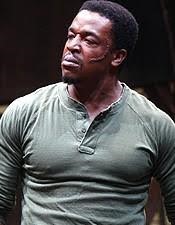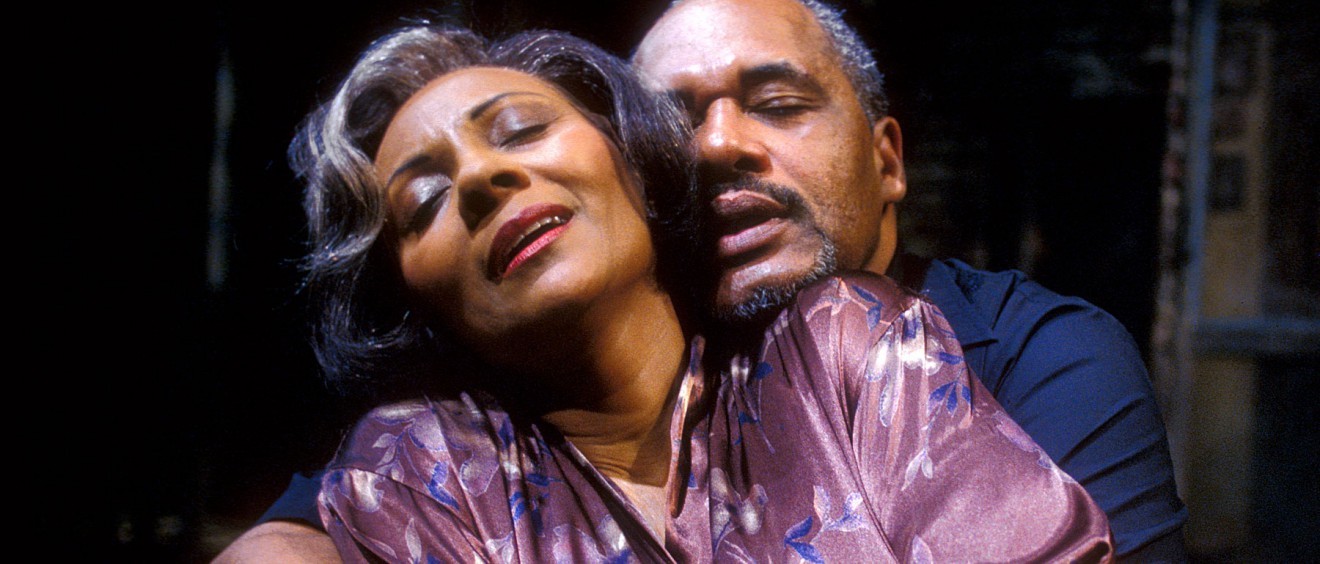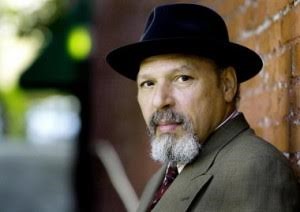AUGUST WILSON'S KING HEDLEY II
An Analysis
By Amir Bey
Special by THE NEW TIMES HOLLER!
A SONG FOR MY FATHER?
© Amir Bey, 2016
January 4
|
Reading King Hedley II was the most painful and wrenching of August Wilson’s Century Cycle plays for me to experience, and I look forward to seeing it one day!
Although it takes place in Pittsburgh, Washington DC during the Crack years is said to be its inspiration. Supposedly when Wilson visited there he was so unnerved that he stayed in his hotel room.
|
KING HEDLEY II

Russel Hornsby as King Hedley II
|
|
King Hedley II immediately followed Seven Guitars when it was written and premiered, and there are important connections: Ruby, a fly young woman in her late 20s was the niece of Louise.
She is now 65 years old with a 35 year-old son, King Hedley II, named after his assumed father, King Hedley, who killed Floyd with a machete in Seven Guitars. Canewell in Seven Guitars became Stool Pigeon
because he gave the police information about Floyd’s killing; both Leroy Slater the biological father of King, and Elmore, the two suitors of Ruby before she arrived in Pittsburgh from Alabama were mentioned in Seven Guitars;
Elmore had killed Leroy Slater, and young Ruby wasn’t sure which one was the father of the baby she was carrying. She let the elderly King Hedley think he was the father.
King Hedley II with no father or step-father changes the father-son conflict of Wilson’s plays. Instead there is the lack of a father for King that drives the father-son conflict. King Hedley I died when King was 3, and he never knew his biological father Leroy.
DEATH IN THE CYCLE
There is pain in Wilson’s plays that at times feels unnecessary. The humor can be as pungent, offsetting the upcoming tragedies; Jitney has some of the funniest exchanges in the Cycle, and Boy Willie in The Piano Lesson!. But joy is hard-pressed, squeezed through pressures
with sorrowful finalities that make it difficult to see the hopes of the characters. There are grim turns that cause wonder and ask for alternatives to the pain. Don’t those alternatives exist within the Black community, in family interactions that are not overwhelmed or
distracted by racism? Is there too much dwelling on the negative, are all Black dreams deferred?
Wilson’s concluding use of and the context for death in the Cycle is one of his hallmarks. Its role and occurrence has a punctuating effect as death does in life. Seven Guitars starts with talk of angels taking a soul to heaven at a funeral, that was actually Floyd’s who is to die later.
That became apparent when those angels were lifting Floyd’s soul after he is killed in the end. The Cycle’s death can be abrupt and tragic, the violent deaths were Blacks by Blacks, although two of those deaths were indirectly caused by the actions of whites, with two deaths due to age or an unspecified illness.
Early in King Hedley II Aunt Esther, the Queen Mother of the Cycle, dies at the age of 366. By dying in 1985 she was born in 1619, the first year that a documented African arrived in the continental US, a year prior to the pilgrims’ arrival; thus her life spanned the time that Africans came here, and before the Puritans.
Aunt Esther’s death is devastating, a harbinger of hopelessness. In the Cycle, she appears only in Gem of the Ocean, the next to the last play written, yet the first decade of the Cycle, 1904; she is mentioned with reverence in each play, is the spiritual and moral anchor of the community, the “Mother” of many, giving guidance and salvation,
washing troubled souls. Stool Pigeon warns:
“Lock your doors! Close your windows! Turn your lamp down low! We in trouble now. Aunt Esther died! She died! She died! She died!”
They say her death came from grief, reflecting the fragmentation of the Black community during the upheavals and voids of the 1970s.
King tells of being given a key ring without a key by Aunt Esther. Stool Pigeon, who is one of Wilson’s poetic spiritualists, his prescient “Out” brothers,
says that King must find the key to put onto it. Those spiritual/Out characters do not have the central, binding spirituality of Aunt Esther.
In a sense they are more earthly, human; Aunt Esther’s spirituality is an uplifting loving sanctity with powers.
As King Hedley II develops, it is evident that violence will happen. There are many weapons: King’s 9 mm Glock, Elmore’s Smith & Wesson 38 Special,
a derringer that changes hands three times, winding up in Ruby’s possession; Mister’s 9 mm Beretta, and the now-rusted machete King Hedley I used to kill Floyd that Stool Pigeon gives to King.
King killed a man named Pernell before the story takes place because he scarred King’s face with a razor, and Pernell’s cousin is in town looking for revenge.
King’s response is to load his Glock and look for the cousin. He did 7 years for Pernell’s murder, and since his release has been involved in low-level and sometimes violent crime.
On page 69 King and Mister talk about the Derringer that Elmore sold to Mister:
King: Do it work?
Mister: Yeah, it work. I’m gonna get me some silver bullets. Be like the Lone Ranger.
King: I ain’t thinking about no Lone Ranger. (Checks clip)
Mister: That Glock is nice but a Beretta be better.
|
|
|
TENSIONS ERUPT

Leslie Uggams as Ruby, Charles Brown as Elmore
|
A brewing intensity that Wilson so effectively creates is that Elmore, Ruby’s long-time off-and-on lover, the killer of Leroy who was King’s biological father, wants to tell King that he killed Leroy.
This generates a powerful undercurrent with a terrible complexity. Violent death is inevitable, the question is who will it be and by whom? There is Pernell’s cousin looking for King, and visa-versa;
King and his Ace, Mister, pull a robbery; Elmore versus King another possibility;
Ruby has the derringer, which Mister gave to her after he bought it from Elmore; meanwhile King cleaned and sharpened King Hedley I’s machete.
Although King and Mister are prone to violence and crime, they are not as selfish as Elmore. Even when King and his wife Tonya fight, he wants stability by starting a video store and having a family;
when Tonya wants an abortion, King fiercely expresses his desire to have the child, seeing it adding a positive element to his life. Elmore has always been gambling, lying, cheating, manipulating.
His killing of Leroy he twists to make him seem justified and innocent, and his desire to tell King the truth is motivated by rationalized self-interest. Every interaction and deal is false,
from the fake jewelry that he gives to Ruby, or the derringer that he sells to Mister. Before his entrance there is a discussion about a broken watch that he sold to King. Because of his age
and his relationship with Ruby, he would almost be a “father,” but instead he is the anti-father.
Elmore, after proposing to Ruby with her accepting, in a series of anguished dialogues he graphically describe how he shot Leroy Slater, his feelings of denial and numbness after the killing,
and Ruby tells how she had to identify his body. Ignoring Ruby’s pleas, Elmore erupts with the truth of King’s paternity. King leaves to visit his late wife Neesi’s grave then decides on a way
to avenge and settle his father Leroy’s accounts by paying the fifty dollars that Elmore says Leroy owed him. He begins a dice duel with Elmore. Mister insists that King let him cover his back and King refuses.
The dice duel and earlier parleys on the prices of hot items, guns, gambling, or the value of fake jewelry, are chilling mathematics that measure degrees of “manhood,” how one should be paid back,
or what constitutes justification for blowing someone’s face off. King or Elmore may kill the other: during the duel King pulls the machete on Elmore then stops, and Elmore pulls his gun on King then not wanting to kill him.
Ruby runs into the house (the play takes place in the backyards of two houses and an empty lot) screaming “Elmore!” And when Ruby comes back from the house and King turns to her, exclaiming
“Mama!” She inadvertently shoots him in the throat with the derringer. This recalls the death of Floyd in Seven Guitars, whose throat was slit, soon after he robbed a store, as with King; both were looking towards using the hold-up money to move out,
Floyd planning to take his girlfriend Vera, and King, Tonya.
COMPARE AND CONTRAST
A 1965 Japanese film, Samurai Assassin, has a similar tension. Directed by Kihachi Okamoto, starring Toshiro Mifune, and adapted from a novel by Jiromasa Gunji, about a Ronin (masterless) samurai who was illegitimate.
To attain respectability he joins conspirators to assassinate the chief advisor to the Shogun. The official is actually the samurai’s biological father. When the conspirators find out, they hire assassins to kill him on the morning of the attack,
lest with his powerful sword he foils their plot. He kills his attackers and to the distress of film viewers he joins the conspirators, thinking the hired assassins were sent by the official to kill him. As the assassination painfully proceeds,
through his determined sword he slays and decapitates the official/father, mounting his head on his sword and gleefully runs with it, ending the film. Likewise King, throughout Elmore’s recital and justification for killing Leroy,
unwittingly agrees with Elmore’s justifications for the killing of his father until he realizes the truth.
There are parallels between Wilson and Anton Chekhov, and contrasts; it turns out that Chekhov was one of Wilson’s favorites. The Cycle sharply differs with Chekov’s short stories and plays by taking place in late 19th Century, early 20th Century Russia,
in petty bourgeoisie and upper class settings with hierarchical relationships between the characters. Even though Chekhov was a compassionate physician giving poor patients free treatments, his Peasants is written from the perspective of a
middle-class educated professional; and his characters’ passions are self-absorbed and 19th Century discreet compared to Wilson’s. Wilson, who closely observed people in barbershops, pool halls, on the street, and other everyday scenes created collective voices.
The Cycle is a record of how Black men often interact, not always positively, as well as Black women. Two Chekhov plays where death similarly appears are Ivanov, and Three Sisters. In Ivanov a man has lost the desire to live;
the play employs what is called Chekhov’s Gun: if a gun is in a play it must be used, otherwise it is superfluous. Guns appear in an incidental fashion, unlike the direct associations of guns with the King Hedley II characters.
Ivanov kills himself – offstage – at the very end of a play that until then was cloaked in almost farcical dialogue. Death in Chekhov’s Three Sisters from a duel occurs coincidentally, and as with Ivanov, bringing all of the threads together.
Wilson’s deaths are more total, engaging even vital, occurring violently, alarmingly, and in front of the audience. Chekhov’s father was a physically abusive devout orthodox Christian, and that hypocrisy is reflected in some of his characters.
Wilsons’s work received motivation from the negative relationship he had with his abusive German-American father, and was informed by his experiences with the Black men that his mother later married.
While Chekhov is hailed as being the “greatest” short story writer, he is melodramatic compared to playwrights from the mid-20th Century and later confront social and personal issues in unadorned and provocative ways. King Hedley II and Samurai Assassin
have more riveting intensity than Ivanov, possibly because they are mid and late- 20th Century works; Samurai and Ivanov peer into the psychology of their characters, and less about the collective identity of the Cycle. Wilson and Chekhov set their plays
in familial situations. Chekhov’s stories feature the class differences in Russian society during his time, and the sexual longings of would-be extramarital lovers; in the Cycle there are broader ranges in sexual relations, and the racial segregation of
America doesn’t allow for social intermingling, only three of the ten plays feature whites, and only Radio Golf, the last play, features Blacks from different classes.
|
|
|
AUGUST WILSON
1945-2005

|
AFTERWARD
Wilson wrote an afterward in King Hedley II. He says he did not write the Cycle as history, for which there are plenty of sources.
He was more interested in the culture and community of African Americans. In some Cycle plays social and linguistic distinctions between the decades aren’t clear.
There are connections between people through the decades, with some aging, appearing, or being mentioned between generations. Some expressions remain throughout,
except the last, Radio Golf. Wilson is a sharp observer of Black speech and is historically correct (HC) with phrases such as on page 83 where Ruby is talking to Tonya saying,
“He had a car with a top you could put down.” At first glance, why not use “Convertible,” instead of “with a top…”? Because Black folks would call a convertible a “Top-down,”
in the 40s when Ruby was a young, fly singer, and still using that expression years later in 1985.
As Wilson said, he was not an historian, yet the Cycle plays will become documents for certain aspects of 20th Century African America. Documents that will evolve through interpretations
by future directors, actors, designers, and film makers. Writers and actors have felt the musicality, the blues in the Cycle’s dialogues; scores could be written transforming the Cycle into blues arias and operas.
Wilson listened to the music from each decade while he wrote the Cycle. It would be interesting to know what his playlists for them were!
|
|
|
|
| | |